8下英语笔记整理知识讲解
八年级下册英语四单元笔记
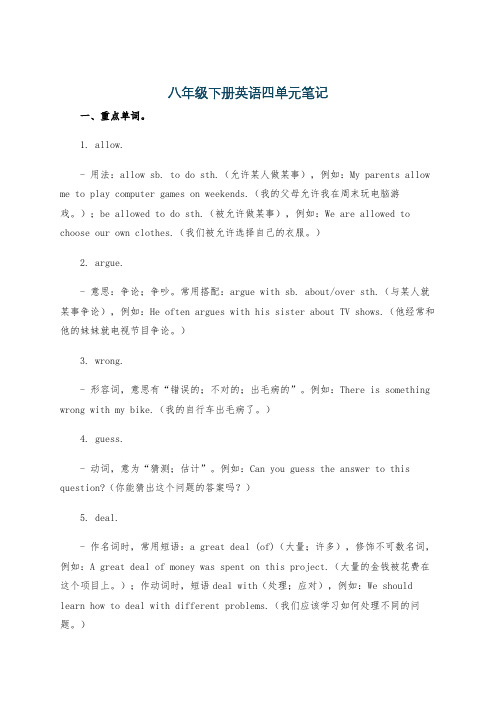
八年级下册英语四单元笔记一、重点单词。
1. allow.- 用法:allow sb. to do sth.(允许某人做某事),例如:My parents allow me to play computer games on weekends.(我的父母允许我在周末玩电脑游戏。
);be allowed to do sth.(被允许做某事),例如:We are allowed to choose our own clothes.(我们被允许选择自己的衣服。
)2. argue.- 意思:争论;争吵。
常用搭配:argue with sb. about/over sth.(与某人就某事争论),例如:He often argues with his sister about TV shows.(他经常和他的妹妹就电视节目争论。
)3. wrong.- 形容词,意思有“错误的;不对的;出毛病的”。
例如:There is something wrong with my bike.(我的自行车出毛病了。
)4. guess.- 动词,意为“猜测;估计”。
例如:Can you guess the answer to this question?(你能猜出这个问题的答案吗?)5. deal.- 作名词时,常用短语:a great deal (of)(大量;许多),修饰不可数名词,例如:A great deal of money was spent on this project.(大量的金钱被花费在这个项目上。
);作动词时,短语deal with(处理;应对),例如:We should learn how to deal with different problems.(我们应该学习如何处理不同的问题。
)6. relation.- 名词,意思是“关系;联系;交往”。
例如:The relation between the two countries is very important.(两国之间的关系非常重要。
八下英语笔记
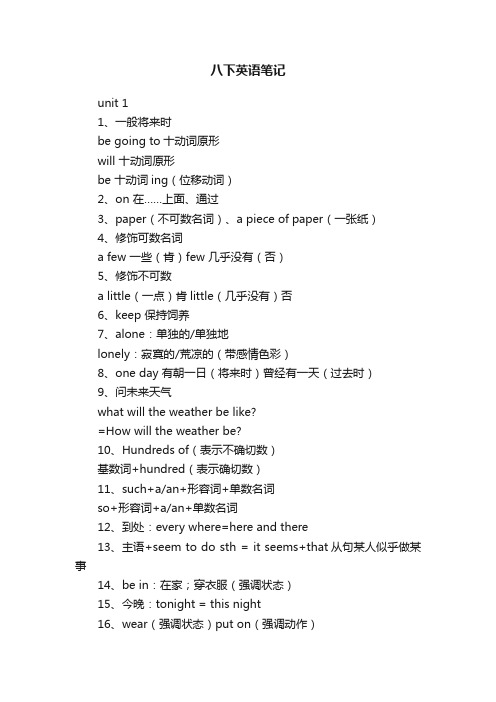
八下英语笔记unit 11、一般将来时be going to十动词原形will 十动词原形be 十动词ing(位移动词)2、on 在……上面、通过3、paper(不可数名词)、a piece of paper(一张纸)4、修饰可数名词a few 一些(肯)few 几乎没有(否)5、修饰不可数a little(一点)肯little(几乎没有)否6、keep 保持饲养7、alone:单独的/单独地lonely:寂寞的/荒凉的(带感情色彩)8、one day 有朝一日(将来时)曾经有一天(过去时)9、问未来天气what will the weather be like?=How will the weather be?10、Hundreds of(表示不确切数)基数词+hundred(表示确切数)11、such+a/an+形容词+单数名词so+形容词+a/an+单数名词12、到处:every where=here and there13、主语+seem to do sth = it seems+that从句某人似乎做某事14、be in:在家;穿衣服(强调状态)15、今晚:tonight = this night16、wear(强调状态)put on(强调动作)dress sb (给某人穿衣服)be in(强调状态)17、help sb( to) do sth(帮助某人做某事)help sb with sth(在某方面帮助某人)18、疑问词+do yor think+主+谓+其他Belive+that 从句19、…ago(…以前)用一般过去时宾语从句→用陈述句(主+谓)fly to +地点“in+一段时间”用“Hou long”提问There will be +主+其它(将会有)20、live to be + 年龄(活到…岁)it is +形+(for sb)to do sth对某人来说做某事怎么样look up (查找)fall in love with 人/物(爱上某人或某物)be able to = can(能;会)There be sb doing sth (有人正在做某事)worry about sb (担心某人)be used for (用来做什么)unit 21、某人怎么了?what`s wrong with sb?what`s the matter with sb?what`s the trorble with sb?what`s up?2、给某人打电话?Call sb up = ring sb up3、你认为某人某物怎么样?what do you think of sb/sth?=How do you like sb/sth?4、对主语来说borrow sth from sb (借进)lend sth to sb (借出)5、为某人买某物buy sth for sb = buy sb sth6、either(句末)否too (句末)肯also(在句中be动词/情/助之后,实义动词前肯)7、把某物归还某人return sb sth =return sth to sb和某人打架fight with sb = have a fight with sb8、get on 上车、相处建议advice (名)advise(动)9、各种各样all kinds of参加take part in+活动join+组织compare…with(与…比较)compare…to(把…比作)10、find sb doing sth 发现某人正在做某事advice sb to do sth 建议某人做某事see sb doing sth 看见某人正在做某事ask sb for help 寻求帮助argue with sb 与某人争论11、enough(修饰形/副词时enough 放在后)call sb at…(拨打电话…找…)特殊疑问词+动词不定式(to+动词原形)相当于名词:It`s time for +名(该是…时候)= It`s time to do sth13、sb spend 时间/钱+(in)doing sthsb spend 时间/钱+on sth(某人花费多少时间/钱做某事)sb+pay+钱for sth (某人为…付…钱)物+cost+sb+钱(某物花费某人多少钱?)It takes sb+时间to do sth(某花人费多少时间做某事)14、告诉某人(不要)做某事tell sb to do sthtell sb (not) to do sthmay be (也许)副may be(可能是)谓语unit 31、was/were+动ing (过去进行时)get out of (从…出来)be interested in(对…感兴趣)over = more than (超出)about = around(大约)2、when:两个动作可以同时发生、先后发生while:两个动作同时发生,从句常用进行时3、到达:arrive at + 小地点arrive in + 大地点get to + 地点reach + 地点4、imagine doing sth (想象做某事)imagine + that 从句5、感叹句what + a/an+单数名词+主+谓!how + 形/副+主+谓!6、shout at sb(对…大声喊)有责备之意Shout to sb (对…高声叫喊)7、in a tree(外来人或物在树上)on a tree(本身长在树上)发生:happen(偶然发生)、take place(计划中的事情)8、somewhere (某处)肯anywhere (任何地方)否定句或疑问问中everywhere (到处)肯定9、最后:finally(副)=at last =in the end10、evevy(日常的)形every day (每天)用在一般现在时unit 41、be mad at sb = be angry with sb 对某人生气不再not…anymore = no more (be动词之后,实义动词前) be supposed to=should 应该;应当be supposed to do sth 应当做某事2、take a message for sb 给某人捎口信leave a message 留口信3、be good at=do well in 擅长…+ed 的形容词→修饰人+ing的形容词→修饰物做某事遇到困难:have a hard time with sthhave a hard time doing sthwant to know = wonder 想知道4、be nervous 紧张的get nervous 变得紧张feel nervous 感到紧张luck(名)幸运lucky(形)幸运的ludeily(副)幸运地决定:decision(名词)>decide(动词)decide to do sth决定的做某事out of danger (脱离危险)in danger 危险(名词)dangerous 危险的(形容词)5、both…and(两者都)between…and (两者)之间open up one`s eyes (使某人开眼界)unit 51、let out 允许出去let in 允许进入or 用在否定/一般疑问句中and,用在肯定句中2、want sb to do sth 想要某人做某事ask sb to do sth 叫某人做某事3、why not +动词原形=why don`t you+动词原形all over the world = around the world 世界各地4、以…而闻名:be famous as +职业be famous for+原因cook 名词:厨师;动词:做饭cooker 炊具;cook sth for sb,为某人做某东西5、spend time with sb 和某人共度时光laugh at sb 嘲笑某人make +人+形容词(使某人处在…状态)had better (not) do sth 最好(不)做某事6、If+一般现在时,主句一般将来时7、make money 赚钱make a living(by)doing sth 靠做某事谋生8、be against sb/sth 反对某人/某事unit 61、现在完成进行时:have /has+been+动ing 现在完成进行时:①用for+一般时间②Since+过去时间点③Since+从句④Since+┅ago2、raise sth for sb 为某人筹集某物Several=a few基数词+and a half year=基数词+years and a half3、collect 收藏(动词)collector 收藏家(动词)collection 收藏品(名词)4、anyone=anybody作主语时,谓语动词用单数,用在否定句/疑问名/条件状语从语5、on one`s+序数词+birthday在某人的第几个生日6、finish doing sth 完成做某事7、准确数:基数+thousand不准确数:thousand+of8、How much ①对价钱提问;②对不可数名词数量提问9、be certain that从句(确信…)10、It`s+形容词+(for sb)+to +do+sth对某人来说,做某事怎么样11、“the+形容词比较级、the+形容词比较级”“越…越…”“形容词的比较级+and形容词比较级”“越来越…”12、enjoy doing sth“喜欢做某事”hear+that 从句(陈述句)14、East 东方东方的South 南方南方的+ernWest 西方西方的north 北方北方的15、far away 在远处far from 离…远16、用光run out of 主语是人run out 主语是物unit 71、Would you mind(not)doing sth? =Would you mind+if 从句你介意(不)做…吗?2、回答:不介意:①No,not at all②certainly not③of course not介意:①I`m sorry but…②I`m afraid…③Yes,You`d better not…3、right away (立刻,马上)=at once=right now →用在将来的时态中=in a minute4、Could you please (not)do sth?请你(不)做…好吗?5、工作任务work(不可数名词)job(可数名词)task (可数名词)它是一个令人困难、疲倦的工作6、complain about sth 抱怨做某事give---gave---givenbring---broughtbuy---boughtchoose---chose---chosen7、sth doesn't work=There is some thing wrong with sth某东西坏了8、形容词:annoying 使…生气的(物)annoyed 生气的(人)annoy 使…生气(动词)9、be friendly to sb 对某人友好be polite to sb 对某人有礼貌10、try to do sth 尽力做某事try not to do sth 尽力不做某事11、the way to +地点welcome to +地点(欢迎来到某地)12、否定前缀polite---impolite 礼貌Possible---impossible 可能13、小心:take care = be careful = look out take care to do sth小心做某事14、pick up:捡起;接人;搭车15、allow sb (not)to do sth允许某人(不)做某事be(not)allowed to do sth (不)被允许做某事17、keep(on) doing sth 继续做某事18、sth happens to sb 某事发生在某人身上happen to do sth 碰巧…19、即使even if =even thoughunit 81、why don't you do sth?=why not do sth?你为什么不做…2、get sb sth=get sth for sb给某人买某物3、How about…?=what about…?……怎么样4、scarf的复数,将f改为v,再加es scaves6、感叹句What+a/an+形+名词单数+主谓!What+形+名词复数/不可数名+主+谓!How+形/副+主+谓7、合成形容词基数词---单数名词---形容词例:5---year---old 5岁的8、too…to+动原形太…而不能…so…that 从句如此…以致not…enough to+动原形不够…做…9、called=named not…at all 一点也不10、be interested in…=take an interest in…对…感兴趣11、sleep(动、名)asleep(形、只作表语)sleepy (困倦的,有睡意的,但没有睡着,作定语)12、too many+可数名词的复数太多too much+不可数名词much too (太)14、rather than = instead of 而不是16、nearly=almost 几乎hardly 几乎不17、suggest(动)建议suggestion(名)可数名词不可数名词:advice18、suggest doing sth建议做某事make sb do sth让某人做某事encourage sb to do sth鼓励某人做某事20、除…之外except:(除…之外,其他都…)后面的人或物被排除在外besides(除…之外,还有…)后面的人或物包括在内make friends with sb和某人交朋友21、share sth with sb 和某人分享某物make progress 取得进步unit 91、have / has been to +地点曾经去过某地(不在原地,已回来)have / has gone to + 地点去了某地(去的路上/到了那个地方)2、neithor的用法(两者都不)1)neither+单数名词2)neithor of +人称代词/名词复数3)neither+be/助/情态动词+另一个主语(上面提到的否定情况,也适用于另一个主语)4)neither…nor…既不…也不…3、end up with=finish doing sth 以…结束4、在现在完成时中,短暂性动词不能与一段时间连用,必须转化延续性动词。
八年级下册英语第四单元笔记

八年级下册英语第四单元笔记一、重点单词1、 allow (v)允许;准许常用搭配:allow sb to do sth 允许某人做某事例如:My parents don't allow me to stay up late 我的父母不允许我熬夜。
2、 wrong (adj)错误的;不对的反义词:right 正确的例如:What you did is wrong 你做的是错的。
3、 guess (v)猜测;估计例如:Can you guess the answer? 你能猜出答案吗?4、 deal (n)协议;交易常用搭配:make a deal 达成协议例如:They made a deal to solve the problem 他们达成协议来解决这个问题。
5、 relation (n)关系;联系;交往常用搭配:have a relation with 与有关系例如:The relation between them is very good 他们之间的关系很好。
6、 communication (n)交流;沟通动词形式:communicate 交流;沟通例如:Good communication is very important in a family 在一个家庭中,良好的沟通非常重要。
7、 argue (v)争吵;争论常用搭配:argue with sb about sth 因某事与某人争吵例如:They often argue with each other about money 他们经常因为钱而互相争吵。
8、 cloud (n)云;云朵形容词形式:cloudy 多云的例如:There are many clouds in the sky 天空中有很多云。
9、 elder (adj)年纪较长的辨析:elder 常用来表示兄弟姐妹之间年龄较大的;older 则更常用于表示人或物的年龄较大。
英语八下知识点总结

英语八下知识点总结英语八下的学习内容涵盖了诸多方面,包括词汇、语法、阅读、写作等。
为了帮助大家更好地巩固所学知识,本文将为大家总结英语八下的重要知识点。
一、词汇1.动词短语:本学期学习了大量的动词短语,如:turn off、turn on、get up、go on、put on、take off等。
2.形容词和副词:掌握了一些常用的形容词和副词,如:happy、sad、tall、short、fast、slow等。
3.名词:学习了各类名词,包括人物、动物、物品、地点等,如:teacher、doctor、policeman、student、cat、dog、pen、pencil、school、park等。
二、语法1.现在进行时:表示正在进行的动作或状态,如:I am watching TV.2.一般将来时:表示将来要发生的动作或状态,如:I will go to the park tomorrow.3.现在完成时:表示过去发生的动作对现在造成的影响或结果,如:I have finished my homework.4.情态动词:学习了can、may、must等情态动词的用法,如:Can I go out now? May I come in?三、阅读1.短文阅读:通过阅读短文,提高阅读理解能力,掌握文章的主旨大意。
2.故事阅读:学习了一些有趣的故事,如《灰姑娘》、《小红帽》等。
3.信息匹配:根据文章内容,完成相应的信息匹配题。
四、写作1.书信:学习了书信的格式和写作方法,如:感谢信、邀请信、道歉信等。
2.看图作文:根据图片内容,发挥想象力,完成作文。
3.故事续写:根据给定故事的开头,发挥想象力,完成故事续写。
总结:英语八下的学习内容丰富多样,希望同学们在掌握以上知识点的基础上,多加练习,不断提高自己的英语水平。
同时,也要注意培养良好的学习习惯,如:按时复习、多做练习、积极参加课堂活动等。
八年级英语下册第三单元笔记

八年级英语下册第三单元笔记一、重点单词。
1. rubbish.- n. 垃圾;废弃物。
例如:There is a lot of rubbish on the street.(街道上有很多垃圾。
)2. fold.- v. 折叠;对折。
如:Fold the paper in half.(把纸对折。
)3. sweep.- v. (swept, swept) 扫;打扫。
例如:I sweep the floor every day.(我每天扫地。
)4. floor.- n. 地板;地面。
如:The book is on the floor.(书在地板上。
)5. mess.- n. 杂乱;不整洁。
例如:What a mess!(多么杂乱啊!)6. throw.- v. (threw, thrown) 扔;掷。
例如:Don't throw rubbish everywhere.(不要到处扔垃圾。
)7. neither.- adv. 也不。
用于否定句中,表示前面所说的情况也适用于后者。
例如:He doesn't like apples, neither do I.(他不喜欢苹果,我也不喜欢。
)- pron. 两者都不。
例如:Neither of them is right.(他们两个都不对。
)8. shirt.- n. 衬衫。
如:This is a white shirt.(这是一件白色的衬衫。
)9. pass.- v. 给;递;走过;通过。
例如:Pass me the salt, please.(请递给我盐。
);He passed the exam.(他通过了考试。
)10. borrow.- v. 借;借用。
例如:Can I borrow your pen?(我能借用你的钢笔吗?)11. lend.- v. (lent, lent) 借给;借出。
例如:I can lend you some money.(我可以借给你一些钱。
八下英语笔记
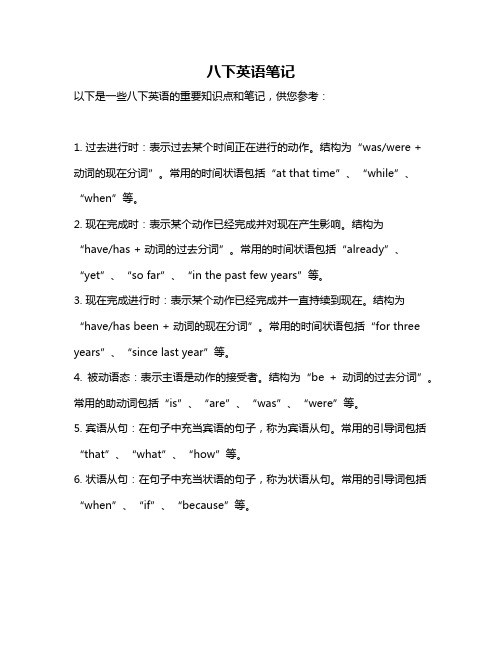
八下英语笔记以下是一些八下英语的重要知识点和笔记,供您参考:1. 过去进行时:表示过去某个时间正在进行的动作。
结构为“was/were + 动词的现在分词”。
常用的时间状语包括“at that time”、“while”、“when”等。
2. 现在完成时:表示某个动作已经完成并对现在产生影响。
结构为“have/has + 动词的过去分词”。
常用的时间状语包括“already”、“yet”、“so far”、“in the past few years”等。
3. 现在完成进行时:表示某个动作已经完成并一直持续到现在。
结构为“have/has been + 动词的现在分词”。
常用的时间状语包括“for three years”、“since last year”等。
4. 被动语态:表示主语是动作的接受者。
结构为“be + 动词的过去分词”。
常用的助动词包括“is”、“are”、“was”、“were”等。
5. 宾语从句:在句子中充当宾语的句子,称为宾语从句。
常用的引导词包括“that”、“what”、“how”等。
6. 状语从句:在句子中充当状语的句子,称为状语从句。
常用的引导词包括“when”、“if”、“because”等。
7. 虚拟语气:表示与实际情况相反的情况或不可能实现的愿望。
结构为“would/could/might + 动词的过去分词”。
常用的时间状语包括“if only”、“in my dreams”等。
8. 情态动词:表示推测或意愿的动词,常用的情态动词包括“can”、“may”、“must”、“should”等。
9. 不定代词:表示不确定的人、事物或数量的代词,常用的不定代词包括“some”、“any”、“no”、“every”、“all”等。
10. 介词:表示名词、代词与动词之间的关系,常用的介词包括“at”、“in”、“on”、“with”、“by”等。
人教版八下英语u8笔记

人教版八下英语u8笔记
以下是有关人教版八下英语u8的笔记,供您参考:
Unit 8 grammar
一、被动语态的构成:
被动语态由助动词be和及物动词的过去分词构成,其基本结构为“be+及物动词的过去分词”。
使用被动语态时需要根据时态和人称进行变化。
二、被动语态的时态:
被动语态有多种时态,包括一般现在时、一般过去时、一般将来时、现在进行时、过去进行时、现在完成时、过去完成时等。
具体形式如下:
1. 一般现在时:am/is/are+过去分词
2. 一般过去时:was/were+过去分词
3. 一般将来时:will be+过去分词
4. 现在进行时:am/is/are being+过去分词
5. 过去进行时:was/were being+过去分词
6. 现在完成时:have/has been+过去分词
7. 过去完成时:had been+过去分词
三、被动语态的用法:
被动语态常用于以下情况:
1. 不知道或不想指出动作的执行者。
2. 强调动作的承受者。
3. 在科技文献和新闻报道中,为了强调客观事实。
4. 在一些习惯用法中,如“It is said that…”(据说……)和“He will be invited to the party.”(他将受邀参加聚会。
)等。
四、主动语态与被动语态的转换:
将主动语态转换为被动语态的方法是将宾语变成主语,将谓语变成被动结构(be+过去分词),将原主语放在by后面,作为被动句中的宾语。
如果原主语不出现,被动句中常常以it作为形式主语。
八年级下册英语unit6笔记
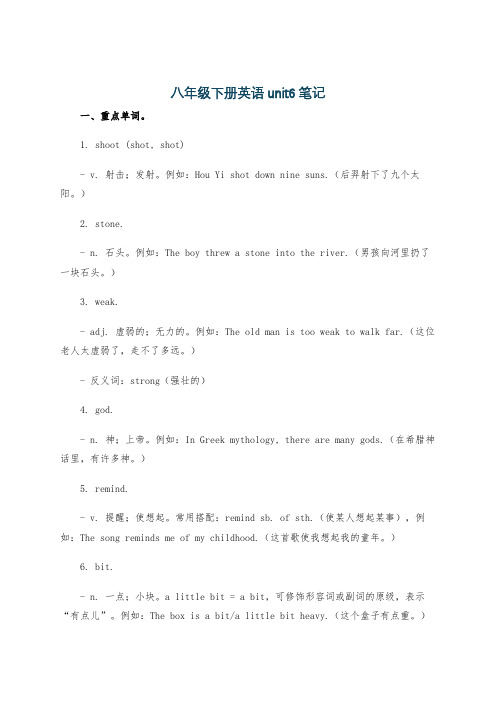
八年级下册英语unit6笔记一、重点单词。
1. shoot (shot, shot)- v. 射击;发射。
例如:Hou Yi shot down nine suns.(后羿射下了九个太阳。
)2. stone.- n. 石头。
例如:The boy threw a stone into the river.(男孩向河里扔了一块石头。
)3. weak.- adj. 虚弱的;无力的。
例如:The old man is too weak to walk far.(这位老人太虚弱了,走不了多远。
)- 反义词:strong(强壮的)4. god.- n. 神;上帝。
例如:In Greek mythology, there are many gods.(在希腊神话里,有许多神。
)5. remind.- v. 提醒;使想起。
常用搭配:remind sb. of sth.(使某人想起某事),例如:The song reminds me of my childhood.(这首歌使我想起我的童年。
)6. bit.- n. 一点;小块。
a little bit = a bit,可修饰形容词或副词的原级,表示“有点儿”。
例如:The box is a bit/a little bit heavy.(这个盒子有点重。
)7. silly.- adj. 愚蠢的;不明事理的。
例如:It was silly of you to believe him.(你相信他真是太傻了。
)8. instead of.- 代替;反而。
例如:I will go instead of you.(我将代替你去。
)二、重点短语。
1. work on.- 致力于;从事。
例如:He is working on a new project.(他正在从事一个新项目。
)2. as soon as.- 一……就……,引导时间状语从句。
例如:As soon as I get home, I will call you.(我一到家就给你打电话。
人教英语八下_Unit 1 Section A 重点单词笔记

人教版八年级下册各单元重点单词笔记Unit1 SectionA1.mattern.问题;事情(1)询问某人的情况=problem重点句型怎么了? What’s the matter (with sb.)? 注意这里的the必须要加What’s wrong with sb.? What’s up? What’s the problem/trouble with sb.?互换(2)表示一个问题或一件事情e.g. They had some important matters to discuss.(3)关于...的问题a matter of sth./doing sth.e.g. Making a plan is a matter of choosing the best time and activities.补充:no matter who/what/when/where 无论...v.有影响matter to sb. 对某人有影响It doesn’t matter to me what you do. 你做什么对我没影响(你做什么我无所谓)2.重要的名词(身体部位)(下列均可数)arm n. 手臂back n. 背,背部ear n. 耳朵eye n. 眼睛foot n. 脚(复数为feet)hand n. 手head n. 头leg n. 腿mouth n. 嘴巴neck n. 脖子nose n. 鼻子stomach n. 胃tooth n. 牙齿(复数为teeth)3.表达生病的用法总结(用have表示得了某种病)(1)have a +疾病名称have a cold/fever/cough 感冒/发烧/咳嗽发高烧have a high fever He is coughing (2)have a +部位+ache n.表示疼痛have a stomach ache/tooth ache/head ache(3)have a +sore adj. 疼痛的;酸痛的+疼痛部位have a sore throat/back——have a very /really sore throat/back√4.liev. ①躺lie-lying-lay-laine.g. As long as you lie down and rest, you will feel much better tomorrow.The bus driver saw an old man lying on the side of the road.①撒谎lie-lying-lied-liede.g.lie to sb. 对某人说谎Don’t lie to me!n. 谎言tell a lie5.restn. ①休息时间(睡眠时间)have/take a good rest①剩余部分;其余the rest of sth.e.g. I would like to spend the rest of my life living with you.v. =relax 休息;放松e.g. Rest your eyes every half an hour.He won’t rest until he finds her.6.breakv. break-broke-broken已学,之前笔记有n. 间歇,休息,暂停(指短暂地歇了一下)①lunch/tea/class break 午饭/下午茶/课间的休息时间①take a break/ take breaksHe worked all day without a break=He worked all day without taking a breakYou need to take breaks away form the computers.7.hurtv. hurt-hurt-hurt①hurt sb./hurt oneself 使疼痛;使受伤He hurt his back /himself when he played tennis outside.If your head and neck still hurt tomorrow, then go to the doctor.①hurt oneself doing sth. 做某事弄伤了自己John hurt himself cutting up the carrots.①hurt one’s feeling 伤害某人的感情/使不快It hurt me to know that he lied to me.adj. 受伤的None of the passengers were badly hurt.8.off adv./prep. 本身意义一般指远离,主要总结含有off的动词短语get off 下车-get on 上车turn off 关上-turn on 打开take off 脱下;飞机火箭的起飞发射put off 推迟cut off 切除take/have three days off 请三天假9.to one’s surprise 一般位于句首,单独用(逗号隔开)10.onto prep. 本身意义一般指朝,向e.g. Some passengers helped Mr.Wang to move the man onto the bus11.troubleUCN(不可数名词). 困难;苦恼e.g. People don’t want to help others because they do not want any trouble.①be in trouble处于困境中Although we are in trouble, we won’t give up.e.g. Now he is in trouble, we should try our best to help him①get (sb.) into trouble (使某人)陷入困境中e.g. If I don’t arrive home on time, I’ll get into trouble!My brother always gets me into trouble with my parents.①have trouble with sth.=have trouble (in) doing sth.做某事有困难e.g. His son had trouble (in)working out the math problem.I had trouble in understanding the meaning of the word.补充:同义的还有have difficulties/problems with sth.=have difficulties/problems (in) doing sth. trouble也可做可数名词,意思是一件麻烦事,烦心事V. 使烦恼,使忧虑;麻烦某人trouble sb.e.g. Sorry to trouble you, but could you tell me the time?What is troubling you these days?12.hitV. hit-hit-hit击;打;撞击①hit sb. (with sth.)e.g. Bus No.26 hit an old man on Zhonghua Road.My parents never hit me when I was a child.①hit sb. +prep.+ the 身体部位hit me on the head/hit him in the facee.g. She hit him on his head with her umbrella.补充:hit常用于被动语态be done e.g. I was hit by a stone.13.right away =at once= in a minute= immediately 立刻;马上The old man had a heart problem and needed to go to the hospital right away.。
英语八下冀教版笔记
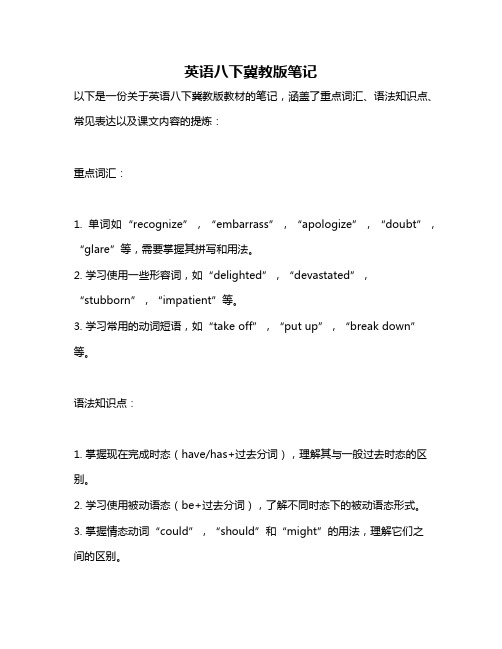
英语八下冀教版笔记以下是一份关于英语八下冀教版教材的笔记,涵盖了重点词汇、语法知识点、常见表达以及课文内容的提炼:重点词汇:1. 单词如“recognize”,“embarrass”,“apologize”,“doubt”,“glare”等,需要掌握其拼写和用法。
2. 学习使用一些形容词,如“delighted”,“devastated”,“stubborn”,“impatient”等。
3. 学习常用的动词短语,如“take off”,“put up”,“break down”等。
语法知识点:1. 掌握现在完成时态(have/has+过去分词),理解其与一般过去时态的区别。
2. 学习使用被动语态(be+过去分词),了解不同时态下的被动语态形式。
3. 掌握情态动词“could”,“should”和“might”的用法,理解它们之间的区别。
常见表达:1. 学习使用一些常用的英语习语和俚语,如“It’s not my cup of tea.”,“That’s a stretch.”。
2. 学习用英语表达建议和意见,如“I think we should...”,“How about...”。
3. 掌握一些常用的表达方式,如“I’m sorry to hear that.”,“It’snot fair.”。
课文内容提炼:课文主要讲述了主人公在成长过程中所遇到的各种挑战和困难,以及如何通过努力和坚持克服这些困难。
同时,课文中也强调了友谊、家庭和团队精神在成长过程中的重要性。
通过学习课文,学生可以更好地理解成长的意义,学会珍惜身边的人和事,并培养积极向上的心态。
以上是一份关于英语八下冀教版教材的笔记,希望对你有所帮助。
八年级下册英语unit8笔记

八年级下册英语Unit 8笔记一、词汇1. Diverse(adj. 不同的,多种多样的)例句:The city has a diverse population, with people from many different countries living together.2. Heritage(n. 遗产,传统)例句:The town has a rich cultural heritage, with many old buildings and traditional events.3. Conflict(n. 冲突,争执)例句:The two countries are in conflict over the ownership of the territory.4. Embrace(v. 拥抱,接受)例句:Themunity needs to embrace the new ideas and work together for a better future.5. Transform(v. 转变,改变)例句:The new government 本人ms to transform the education system for the better.6. Engage(v. 参与,吸引)例句:Thepany needs to engage with its customers to improve its products and services.二、短语1. Get along with(与……相处融洽)例句:I get along with my classmates and we often study together.2. Look forward to(期待,盼望)例句:I'm looking forward to the summer vacation and the trip to the beach.3. Stand out(显眼,出众)例句:Her talent and dedication make her stand out among her peers.4. Be made up of(由……组成)例句:Themittee is made up of experts from various fields.5. In honor of(为了纪念,为了表彰)例句:The event is held in honor of the soldiers who sacrificed their lives for their country.6. In addition to(除……之外)例句:In addition to studying, she also enjoys playing the piano in her free time.三、语法1. 形容词和副词的比较级和最高级形容词和副词的比较级和最高级表示事物在某一方面的程度高低或顺序,一般由比较级+than连接两者进行比较,最高级前常与the连用。
英语八年级下册M1U2知识点

英语八年级下册M1U2知识点本篇文章主要介绍英语八年级下册第一单元第二课的知识点。
这节课主要涉及到四个方面的内容,分别是“谈论爱好”,“谈论偏好”,“游戏规则”和“接受邀请”。
以下将分别介绍这四个方面的知识点。
谈论爱好当我们想要和别人分享自己的爱好的时候,可以说“I love…”或者“I’m interested in…”。
例如,“I love playing basketball.”或者“I’m interested in reading books.”此外,我们还可以使用动词+ing的形式来表达我们正在做的事情,例如“I’m playing football.”或者“I’m reading a book.”谈论偏好当我们想要表达自己对两个或者多个事物偏好的时候,可以使用“prefer”来表达。
例如,“I prefer playing basketball to playing football.”或者“I prefer reading books to watching TV.”在表达偏好的时候,我们还可以使用“like…better than…”的结构,例如“I like playing basketball better than playing football.”游戏规则当我们玩游戏的时候,需要遵守游戏的规则。
在英语中,我们可以说“Let’s read the rules.”或者“What are the rules?”来询问游戏的规则。
在解释游戏规则的时候,需要使用祈使句式,例如“Roll the dice.”或者“Move your piece to the next square.”接受邀请当我们接受别人的邀请的时候,可以使用“Sure.”来表示同意。
例如,“Do you want to play basketball with us?”“Sure.”此外,我们还可以使用“Why not?”来表示同意。
最新北师大版英语八年级下册知识点汇总
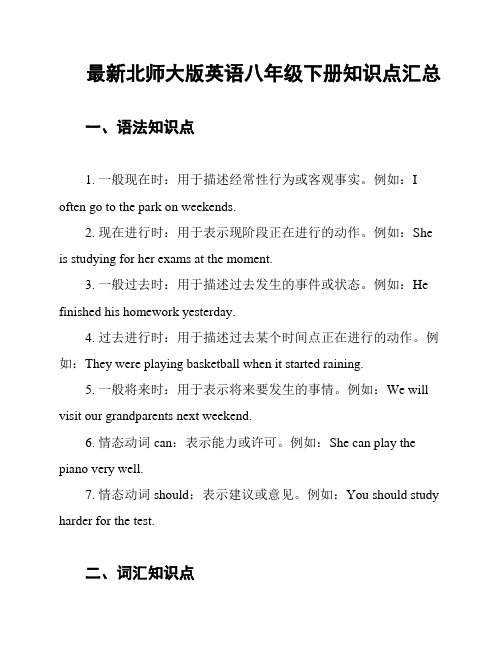
最新北师大版英语八年级下册知识点汇总一、语法知识点1. 一般现在时:用于描述经常性行为或客观事实。
例如:I often go to the park on weekends.2. 现在进行时:用于表示现阶段正在进行的动作。
例如:She is studying for her exams at the moment.3. 一般过去时:用于描述过去发生的事件或状态。
例如:He finished his homework yesterday.4. 过去进行时:用于描述过去某个时间点正在进行的动作。
例如:They were playing basketball when it started raining.5. 一般将来时:用于表示将来要发生的事情。
例如:We will visit our grandparents next weekend.6. 情态动词 can:表示能力或许可。
例如:She can play the piano very well.7. 情态动词 should:表示建议或意见。
例如:You should study harder for the test.二、词汇知识点1. 动物类词汇:例如cat(猫)、dog(狗)、elephant(大象)、tiger(老虎)等。
2. 学科类词汇:例如mathematics(数学)、science(科学)、history(历史)、English(英语)等。
3. 蔬菜类词汇:例如carrot(胡萝卜)、tomato(西红柿)、cabbage(卷心菜)、potato(土豆)等。
4. 家庭类词汇:例如father(父亲)、mother(母亲)、brother(兄弟)、sister(姐妹)等。
5. 地点类词汇:例如park(公园)、school(学校)、hospital (医院)、restaurant(餐厅)等。
三、阅读技巧1. 浏览标题和副标题,了解文章的大致内容。
八年级下册英语第8单元笔记
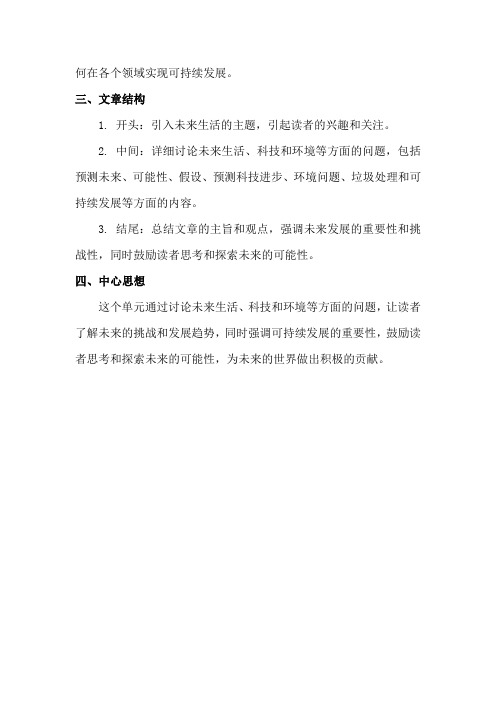
八年级下册英语第8单元笔记一、课文主题这个单元主要涉及未来生活的主题,包括未来生活、科技和环境等方面的内容,以及相关的语法和词汇知识。
二、重点词句1. 未来生活:描述未来生活的特点、优点和挑战,包括未来科技、环境、城市和生活方式等方面。
2. 预测未来:使用一般将来时和情态动词来表达对未来的预测和猜测,例如“will do”和“can/could do”等。
3. 可能性:描述某个事件或情况的可能性或概率,使用情态动词表达,例如“may/might do”和“will/would/could do”等。
4. 假设:使用if引导的条件状语从句来表达假设或条件,例如“if…,…”。
5. 预测:表示对未来某个事件或情况做出预测或预见,例如“predict/predict that…”等。
6. 科技进步:描述科技进步对未来生活的影响和作用,例如人工智能、机器人、医疗技术等方面的进步。
7. 环境问题:讨论未来环境问题的挑战和解决方案,例如气候变化、资源消耗、可再生能源等方面的问题。
8. 垃圾处理:了解未来垃圾处理技术的发展趋势,例如循环利用、生物降解等。
9. 可持续发展:了解可持续发展的概念和重要性,以及未来如何在各个领域实现可持续发展。
三、文章结构1. 开头:引入未来生活的主题,引起读者的兴趣和关注。
2. 中间:详细讨论未来生活、科技和环境等方面的问题,包括预测未来、可能性、假设、预测科技进步、环境问题、垃圾处理和可持续发展等方面的内容。
3. 结尾:总结文章的主旨和观点,强调未来发展的重要性和挑战性,同时鼓励读者思考和探索未来的可能性。
四、中心思想这个单元通过讨论未来生活、科技和环境等方面的问题,让读者了解未来的挑战和发展趋势,同时强调可持续发展的重要性,鼓励读者思考和探索未来的可能性,为未来的世界做出积极的贡献。
八年级英语仁爱版下知识点
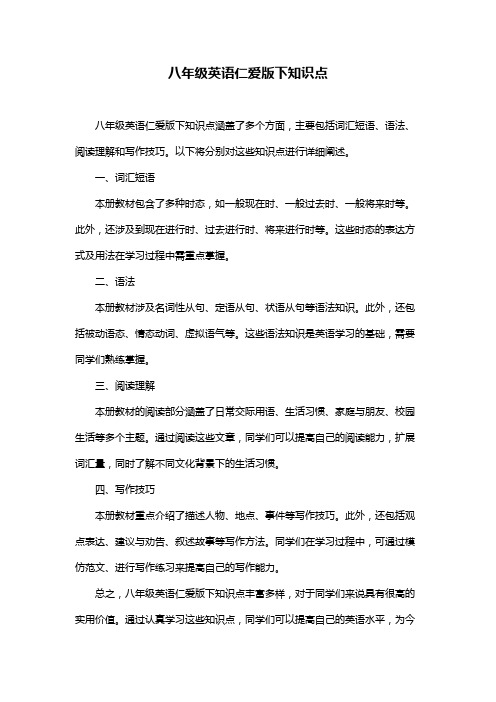
八年级英语仁爱版下知识点
八年级英语仁爱版下知识点涵盖了多个方面,主要包括词汇短语、语法、阅读理解和写作技巧。
以下将分别对这些知识点进行详细阐述。
一、词汇短语
本册教材包含了多种时态,如一般现在时、一般过去时、一般将来时等。
此外,还涉及到现在进行时、过去进行时、将来进行时等。
这些时态的表达方式及用法在学习过程中需重点掌握。
二、语法
本册教材涉及名词性从句、定语从句、状语从句等语法知识。
此外,还包括被动语态、情态动词、虚拟语气等。
这些语法知识是英语学习的基础,需要同学们熟练掌握。
三、阅读理解
本册教材的阅读部分涵盖了日常交际用语、生活习惯、家庭与朋友、校园生活等多个主题。
通过阅读这些文章,同学们可以提高自己的阅读能力,扩展词汇量,同时了解不同文化背景下的生活习惯。
四、写作技巧
本册教材重点介绍了描述人物、地点、事件等写作技巧。
此外,还包括观点表达、建议与劝告、叙述故事等写作方法。
同学们在学习过程中,可通过模仿范文、进行写作练习来提高自己的写作能力。
总之,八年级英语仁爱版下知识点丰富多样,对于同学们来说具有很高的实用价值。
通过认真学习这些知识点,同学们可以提高自己的英语水平,为今
后的学习打下坚实基础。
在学习过程中,要注重理论与实践相结合,及时巩固所学知识,不断提高自己的听、说、读、写能力。
八年级下册仁爱版英语知识点
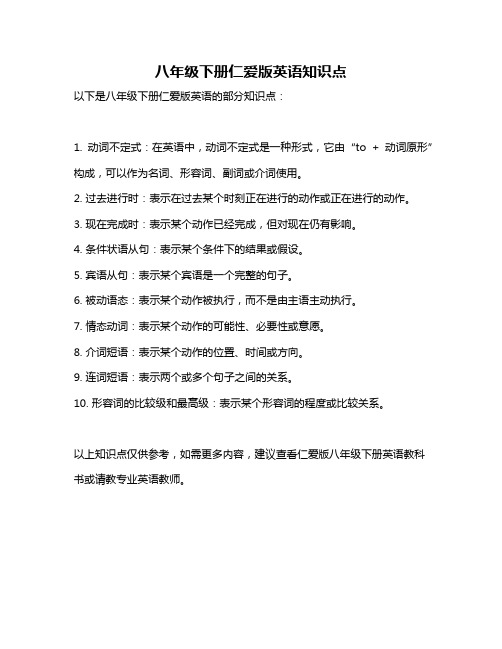
八年级下册仁爱版英语知识点
以下是八年级下册仁爱版英语的部分知识点:
1. 动词不定式:在英语中,动词不定式是一种形式,它由“to + 动词原形”构成,可以作为名词、形容词、副词或介词使用。
2. 过去进行时:表示在过去某个时刻正在进行的动作或正在进行的动作。
3. 现在完成时:表示某个动作已经完成,但对现在仍有影响。
4. 条件状语从句:表示某个条件下的结果或假设。
5. 宾语从句:表示某个宾语是一个完整的句子。
6. 被动语态:表示某个动作被执行,而不是由主语主动执行。
7. 情态动词:表示某个动作的可能性、必要性或意愿。
8. 介词短语:表示某个动作的位置、时间或方向。
9. 连词短语:表示两个或多个句子之间的关系。
10. 形容词的比较级和最高级:表示某个形容词的程度或比较关系。
以上知识点仅供参考,如需更多内容,建议查看仁爱版八年级下册英语教科书或请教专业英语教师。
八下英语第二单元笔记

八下英语第二单元笔记以下是八下英语第二单元的笔记,希望对您有所帮助。
一、重点单词1. vacation n. 假期2. exciting adj. 令人兴奋的3. disagree v. 不同意4. agree v. 同意5. rent v. 租用6. beach n. 海滩7. because conj. 因为8. headache n. 头痛9. cough n. 咳嗽10. fever n. 发烧二、重点短语1. stay at home 待在家里2. go to the mountains 去山上3. go to the beach 去海滩4. visit museums 参观博物馆5. go to the movies 看电影6. stay in bed 卧床休息7. have a good time 过得开心8. feel like doing sth 想做某事9. go for a walk 去散步10. practice doing sth 练习做某事三、重点句子1. I want to go somewhere interesting. 我想去有趣的地方。
2. We’re planning to go to New York for vacation. 我们计划去纽约度假。
3. She would rather stay at home than go out in the rain. 她宁愿待在家里也不愿出去淋雨。
4. He is considering renting a car. 他正在考虑租一辆车。
5. I hope to have a restful vacation this year. 我希望今年能度过一个轻松的假期。
8下英语第一单元英语知识点
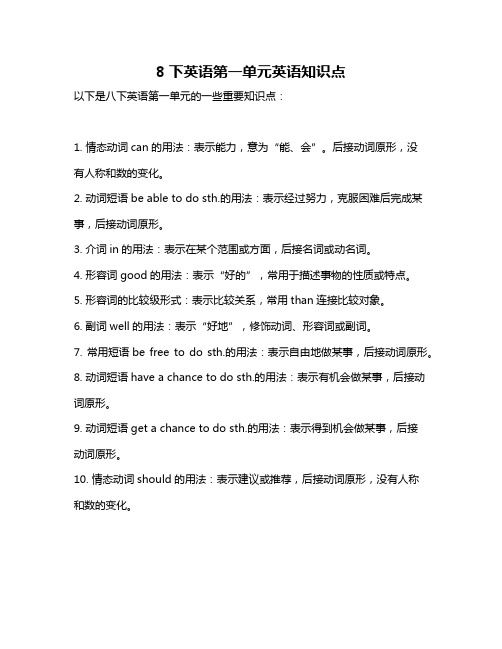
8下英语第一单元英语知识点
以下是八下英语第一单元的一些重要知识点:
1. 情态动词can的用法:表示能力,意为“能、会”。
后接动词原形,没
有人称和数的变化。
2. 动词短语be able to do sth.的用法:表示经过努力,克服困难后完成某事,后接动词原形。
3. 介词in的用法:表示在某个范围或方面,后接名词或动名词。
4. 形容词good的用法:表示“好的”,常用于描述事物的性质或特点。
5. 形容词的比较级形式:表示比较关系,常用than连接比较对象。
6. 副词well的用法:表示“好地”,修饰动词、形容词或副词。
7. 常用短语be free to do sth.的用法:表示自由地做某事,后接动词原形。
8. 动词短语have a chance to do sth.的用法:表示有机会做某事,后接动词原形。
9. 动词短语get a chance to do sth.的用法:表示得到机会做某事,后接
动词原形。
10. 情态动词should的用法:表示建议或推荐,后接动词原形,没有人称
和数的变化。
以上是八下英语第一单元的一些重要知识点,通过熟练掌握这些知识点,有助于提高英语语言能力。
人教 英语 八年级下册 1单元知识点笔记

Unit1 What’s the matter?1.What’s the matter with sb?常用来询问别人怎么了,也用于医生询问病人有什么不舒服。
= What’s the trouble with sb= What’s the problem with sb?= What’s wrong with sb=What happened to sb?2.常见的患病表达:1.Have a +身体部位+ache. I have a headache.2.Have a+sore+身体部位I have a sore back.3.Have a+ 病症She has a cold.4.There is something wrong with +one’s+身体部位。
There is something wrong with my head. 我的头不舒服。
3.Should 情态动词,(can, may, must , could, will, would等)Should+动词原形;一般疑问句: Should +主语+V原形。
?一般疑问句的回答:Yes,主语(对应人代)+should.No, 主语(对应人代)+shouldn’t.否定句:主语+shouldn’t+V原形。
特殊疑问句:特殊疑问词+should+主语+V原形?4.反身代词的构成由第一人称、第二人称形容词性物主代词或第三人称代词宾格加self或selves组成,意为“本人;亲自;自己”一/二人称:My self, our selves, your self, your selves, 三人称:him self, her self, it self, them selves.常见词组: learn sth by oneself 自学help oneself to…随便吃….Enjoy oneself 玩得开心5.lie,动词:撒谎,lied, lied, lying 名词: 谎言lie,平躺,lay, lain, lying lie down 躺下lay, 下蛋,布置,laid, laid, laying.6.Without, 做介词,意为“没有;无”反义词为“with”后接名词/代词宾格/动名词动词固定搭配:1.be used to doing sth…习惯做某事2.have problems(in) doing sth 做某事有困难=have difficulty (in) doing sth=have trouble(in) doing sth.3.mean doing sth 意为着做某事mean to do sth 打算做某事词汇(红色为重要词汇):1.have a cold 感冒2.have a fever 发烧3.have a sore back 背痛4.have a stomachache 胃痛5.lie down and rest 躺下休息6.see a dentist 看牙医7.get an X-ray 拍X光片8.take one’s temperature 量体温9.cut oneself 割伤自己10.put some medicine on….在。
八年级下册英语第五单元知识点笔记
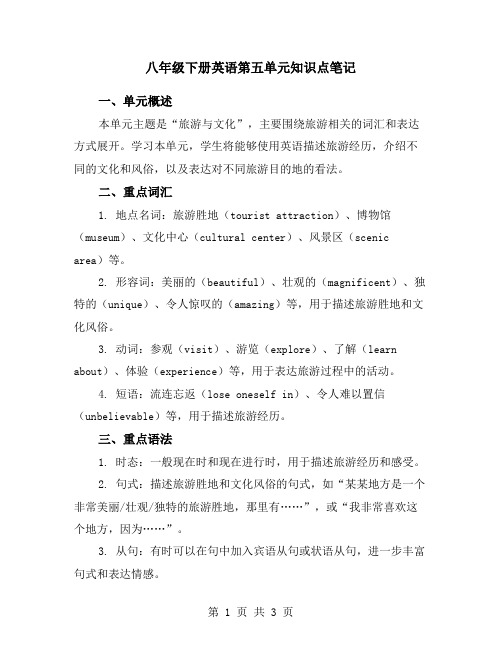
八年级下册英语第五单元知识点笔记一、单元概述本单元主题是“旅游与文化”,主要围绕旅游相关的词汇和表达方式展开。
学习本单元,学生将能够使用英语描述旅游经历,介绍不同的文化和风俗,以及表达对不同旅游目的地的看法。
二、重点词汇1. 地点名词:旅游胜地(tourist attraction)、博物馆(museum)、文化中心(cultural center)、风景区(scenic area)等。
2. 形容词:美丽的(beautiful)、壮观的(magnificent)、独特的(unique)、令人惊叹的(amazing)等,用于描述旅游胜地和文化风俗。
3. 动词:参观(visit)、游览(explore)、了解(learn about)、体验(experience)等,用于表达旅游过程中的活动。
4. 短语:流连忘返(lose oneself in)、令人难以置信(unbelievable)等,用于描述旅游经历。
三、重点语法1. 时态:一般现在时和现在进行时,用于描述旅游经历和感受。
2. 句式:描述旅游胜地和文化风俗的句式,如“某某地方是一个非常美丽/壮观/独特的旅游胜地,那里有……”,或“我非常喜欢这个地方,因为……”。
3. 从句:有时可以在句中加入宾语从句或状语从句,进一步丰富句式和表达情感。
四、知识点笔记1. 词汇用法:要正确使用地点名词和形容词,描述旅游胜地和文化风俗的美丽、壮观和独特之处。
同时,注意动词的时态和语态,表达自己在旅游过程中的活动和感受。
2. 句式结构:掌握常见的旅游相关句式结构,如“我推荐这个地方/这个景点/这个活动……”;“我认为这个地方/这个景点/这个活动……”,以及“我认为这个地方/这个景点应该被更多人知道”等。
3. 从句运用:适当使用从句可以增加句子的复杂性和表达的丰富性。
在旅游英语中,常用的从句有宾语从句、状语从句和定语从句。
例如,“当我来到这个地方时,我被它的美丽/壮观/独特之处深深吸引”或“当我参观博物馆时,我了解到了很多关于……的知识”。
- 1、下载文档前请自行甄别文档内容的完整性,平台不提供额外的编辑、内容补充、找答案等附加服务。
- 2、"仅部分预览"的文档,不可在线预览部分如存在完整性等问题,可反馈申请退款(可完整预览的文档不适用该条件!)。
- 3、如文档侵犯您的权益,请联系客服反馈,我们会尽快为您处理(人工客服工作时间:9:00-18:30)。
8下英语笔记整理Unit 1—101)What’s the problem/trouble/matter withsb?=What’s wrong with you?=What’shappened to sb?怎么了?2)Look well/healthy 看起来很健康3)Get windy 起风了4)The other day 前几天5)就近原则:either……or不是……就是neither……nor不是……也不是not only……but also 不仅……而且there be6)An all—you—can—eat meal自助餐7)By accident/chance意外8)much too adj. too much un..too many cn. 太9)right away=in a minute=at once =rightnow立刻10)get\move sb. onto the bus把xx搬到车上11)in time 及时on time 准时12)on both sides of the road=on either sideof the road在路两边13)think twice 再三考虑14)get off the bus下车(大车)get on thebus上车(大车)15)get out of the car 下车(小车)get in thecar上车(小车)16)act quickly立刻行动17)take action 采取措施18)take sb to sp把某人带到某地19)expect to do/sb to do/+句子期待20)wait for sb/sth等待21)can’t wait to do 迫不及待做某事22)to one’s surprise 令某人吃惊的是23)be surprised to do/at sth/+句子感到吃惊……24)agree to do/with sb 同意……disagree不同意25)It is said that 据说It is sad that 可悲的是26)get into/out of trouble陷入/摆脱困难27)have trouble/problems/difficulty (in)doing sthhave trouble/problems/difficulty with sth 做某事有困难28)be always doing 表达一种情感倾向29)take care of =care for =look after=babysit照顾30)learn sth by oneself=teach oneself自学enjoy oneself玩得高兴help oneself to sth 请自用make oneself at home 随意些hurt oneself 伤到自己say to oneself 自言自语lose oneself in 沉浸于……leave sb by oneself=leave sb alone把某人单独留下buy oneself sth 给自己买introduce oneself介绍自己31、a piece of advice =a suggestion 一条建议advise sb to doadvise doingadvise that sb should do 建议……31)have a nosebleed 流鼻血 a runningnose 流鼻涕32)be sick=be ill 生病33) a sick boy 生病的男孩an ill boy=abad boy坏男孩34)get/be hit on the head by sth被击中头部35)be serious about=take sth seriously 严肃对待36)what else/other things happened?还发生了什么?37)Hit sb in+部位(软)Hit sb on+部位(硬)38)be taken to the hospital被带到医院39)get/be sunburned 被晒伤40)sb run out of sth=sb use up sth某人用光了某物sth run out=sth be used up某物用光了41)be used to doing 习惯做某事used to do曾经常常做某事be used to do 被用来做什么42)take risks to do冒险做某事risk one’s life to do冒生命危险去做43)find oneself sp不知不觉发现自己走到了44)in a dangerous situation在危险的情境中45)be caught被压be caught in the rain淋雨Catch a cold 感冒catch up with sb 赶上某人46)时间/距离/金钱用is47)by oneself =alone 独自48)save his own life拯救他自己的生命49)be/get ready for sth/to do 准备好做某事50)so that 以便于so adj./adv. that如此……以至于such n. that 如此……以至于51)while/after/before/when doing52)lose one’s life失去某人的生命53)mean doing意味着Mean to do 故意做某事54)the importance of health健康的重要性55)decide/make a decision to do 决定做某事56)one’s love for sth某人对xx的爱57)keep/go on doing继续做某事58)experience v. 经历cn.经历un.经验59)give/hand out发下去hand in收上来60)think up=come up with想出61)put off doing 推迟做某事62)set up 建立63)call sb up=call up sb 打电话给某人64)put up 张贴65)volunteer v.志愿n.志愿者volunteer to do\volunteer sth to do66)notice sb do/doing 注意到某人……67)give up doing 放弃做某事68)主肯反否,主否反肯never,hardly,nothing,seldom等有否定意思的词,反问用肯定,词语前缀后缀不管69)start/begin doing/to do 开始做某事70)make a plan to do=plan to do 计划做某事71)at the same time 同时72)a strong feeling of satisfaction强烈的满足感73)the look of joy 开心的表情74)on one’s face75)at the age of 4=when sb was 4 在4岁76)try out for 参加……的选拔77)in one’s eyes 在某人的眼里78)go on a journey=travel to sp旅行79)can’t help doing情不自禁做某事80)put of sth until 把xx推迟到81)be busy doing/with 忙于做某事82)worry about=be worried about 担心83)in one’s free/spare time 在某人的空闲时光84)a good way to do=a good way of doing做某事的好方法85)a host on the radio 电台主持人86)a children’s home 孤儿院87)in need 在需要帮助的时候88)be proud of对……感到骄傲89)not……any more=no more 不再(强调数字)Not……any longer=no longer 不再(强调动作)90)take one’s order点菜Order sb to do命令某人做某事Order sth 预定91)be able to do能做92)be sure to do 确信93)the+adj.表示这一类人94)imagine doing 想象95)bring sth here 带来take sth there带去96)talk to/with sb about/of sth97)have a good understanding of sth 对……有一个好的了解98)send sb to sp 把某人送到某地99)in what other way 用其他什么方式100)volunteer as sth充当……的志愿者101)have interest in sth=be interested in sth 对……感兴趣102)a place of interest 景点103)be strong in sth =be good at sth擅长104)certainly=of course 当然105)get a ride=give sb a ride 让某人搭车106)work on 致力于107)a few=several几个108)return=go back回来【return不与back 连用】109)what a mess好乱啊110)give sb a warm welcome 热烈欢迎某人111)walk the dog=take the dog for a walk遛狗112)否定:neither/nor+助/情态/be+sb肯定:so+助/情态/be+sb113)the whole day =all day一整天114)shout at 吼shout to喊115)find sth/sb adj./n.Find it adj.for sb to do发现……116)coffe or tea,which one would you like?①Either,I don’t mind(都可以)②Neither,I’d like some water(都不要)117)borrow sth from sb从某人那里借到某物Lend sb sth=lend sth to sb借给某人某物118)try/try one’s best to do尽力做某事119)what for=why=how come120)be careful with sth 小心使用某物121)under too much stress/pressure在太大的压力下122)prons and cons of sth 什么的好处与坏处123)in order to do以便于124)mind sb doing介意某人做某事125)be stressed out=be tired 心力交瘁的126)there is no need for sb to do sth=it’s not necessary for sb to do 对某人来说没必要做某事127)provide sb with sth=provide sth for sb=offer sb sth =offer sth to sb提供某物给某人128)environment n.环境environmental adj.环境的environmentall adv. 环境地129)in one’s opinion/view=according to sb/sth 就xx看来130)it’s helpful for their future development 有助于他们将来的发展131)depend on sb 依靠某人it/that depends 看情况132)it’s fair to do 做什么是公平的it’s unfair to do做什么是不公平的133)do one’s part in doing sth 尽xx的本分做某事134)I have no idea =I don’t know我不知道135)as a result 作为一个结果136)be/fall ill 生病137)agree with sb同意某人disagree with sb 不同意某人138)be responsible for 对……负责任139)so as to【不放句首】=in order to =to 为了,表目的140)allow doing/sb to do允许做某事sb be allowed to do 某人被允许做某事141)study until midnight学习到半夜142)get on well with others 和……相处得好143)have a fight/an argument 有争执Fight for sth 为……而战fight against sth 与什么做抗争144)explain sth /explain to sb /explain sb sth 解释145)give sth back to sb=give sb sth back=return sth to sb 把xx还给某人146)it’s not a big deal不是大事 a great deal 大量it’s a deal 成交147)refuse to do 拒绝做某事148)instead【可放句中】instead of doing I didn’t do homework,instead,I played.I didn’t do homework,I played instead. 149)whatever=no matter 无论150)so adj./adv. thatSuch n. that 如此,以至于151)so that/in order that+句子In order to/to/so as to+do以便于152)way to do=way of doing做……得方法153)sb used to do过去常常做某事Sb be used to doing 习惯做某事154)sth run out=sb run out of sth=sb use up sth=sth be used up xx 用完了155)be under the control of sb=be in control of sb在……的掌控中Keep sth under control让……处于掌控之中156)have confidence in sb 对某人有信心157)pay sb M for sth 支付给某人多少钱为了某物158)it’s kind of you=you are kind159)take sth with sb随身携带160)both 的全否定neither all的全否定none161)be in trouble=get into trouble 陷入麻烦162)mean to do故意做mean doing 意味着163)you’d better do/not do 你最好做/不做164)in future 从今以后in the future 在将来165)with one’s permission在某人的允许下166)believe in=trust 信任167)borrow sth from sb【借入】Lend sb sth=lend sth to sb【借出】168)compete with sb 和某人竞争169)make progress 取得进步170)I totally/completely agree我完全统一171)continue doing/to do继续做某事Let’s continue=Let’s go on172)it’s typical of sb to do 对某人来说做什么很平常173)compare sth to sth 把什么比做什么174)win sth赢得什么beat sb in sth 在某方面打败某人175)cut out=delete删除176)can hardly do 几乎不能做某事177)benefit sb 让某人收益178)think for oneself独立思考179)express one’s opinion表达某人的观点180)be suitable for sb 适合某人181)be against sth/doing 反对be for sth/doing 支持182)so far=after now 到家目前为止183)get all wet 全湿了184)all of a sudden=suddenly突然185)catch up with赶上某人186)be busy with sth/doing sth 忙于做某事187)bring sb home 把某人带回家188)join sb in doing/to do 加入某人189)be reason why+句子……的原因190)realize one’s dream 实现某人的梦想191)no wonder+句子难怪192)make it to sth 成功做某事193)the rest of my life我的余生194)take care of=look after=babysit=care for 照顾195)take care =look/watch out=be careful 小心196)point to 被指出197)once upon a time 很久以前198)at the other side另外一边199)be weak in sth =be not good at sth 不擅长什么200)finally =at last=in the end 最后201)enjoy success at sth=succeed in doing=be successful in doing成功做某事Fail to do 失败做某事failure失败者202)call out 宣布203)recently=not long ago最近204)send sb to do sth拍某人去做某事send for a doctor 派人去叫医生205)remind sb of sth 使某人想起某事Remind sb to do提醒某人做某事206)a grown elephant=an adult elephant 一头成年的大象207)a solution of sth ……的解决办法208)a little/a bit/a little bit+adjA little/a bit of n.209)replace 代替210)keep(on)doing 坚持做某事211)go on a journey to sp 去某地旅行212)energetic=full of energy 充满能力的,有活力的213)be loyal to sb 对某人衷心214)turn into 变成215)come out 出版【不能用被动语态】be published 被出版【可用被动】216)become/be interest in sth=show/have (an)interest in sth 对……感兴趣217)be new to sb 对某人来说很新鲜218)It’s a tradition to do 做某事是一个传统219)more than=over超过220)give birth to sb 生育某人221)break sth into pieces把……弄成碎片222)be pleased with sth 对某事感到高兴223)lead sb to sp 带某人到某地224)All roads lead Rome 条条大路通罗马225)sb can’t do=sb be too adj. to do=sb be not adj. enough to do某人不能做某事226)fit 指大小、尺寸合适suit指颜色、款式合适227)be famous as 作为……出名be famous for 为……出名be famous to 在某些人中出名228)keep sth for oneself私自把……保存起来229)all the+n.=the whole+n.全部的230)follow one’s advice采纳某人的意见follow suit 随大流As follows 原因如下231)be made of 由什么制成【看得出材料】Be made from 由……制成【看不出材料】Be made in 在什么地方被制造出来Be made into 被制成什么232)in fact =actually事实上233)a little/a bit/a lot/much/even/still/far 修饰比较级234)world wonders世界奇迹235)feel free to do随便做什么236)as far as I know据我所知237)as you can see 正如你所看到的238)achieve your dream实现你的梦想【可用被动】239)even though=even if=though=although虽然、即使240)force sb to do逼迫某人做某事by force 通过武力241)take a deep breath 深呼吸242)序数词/最高级后的动词用to do243)cover v.遮盖n.封面be covered with sth 被……遮盖Cover sth with sth 用……遮盖……244)risk one’s life doing冒生命危险做某事245)at birth=when it was born 出生时246)live up to xx years活到多少岁247)what’s the size of sth→how big?问大小What’s the length of sth→how long问长度What’s the weight of sth→how heavy?问重量What’s the depth of sth→how deep?问深度What’s the width of sth→how wide 问宽度What’s the height of sth→how high 问高度248)endangered animal濒危动物249)sp is home to sth 某地是某物的故乡250)walk into sb 撞到某人251)run over to sp with excitement激动地跑到某地252)be special to sb对某人来说很特别253)die from【外因】die of【内因】死于……254)or so 用在数词后,大约255)rules on sth……的规则256)protect sb from doing保护某人免受……的伤害257)full of =be filled with满是……fill sth with sth 用什么装满什么258)be due到时间了due to=because of 因为259)choose sb to do 选择某人做某事260)hurry to sp 急忙到某地261)call/name sb sth 给某人起名叫什么262)left behind 被留下的263)grow your hair long 留长头发264)mark of another man’s feet 另一个人的脚印265)come to life 苏醒266)a fan of sth……的粉丝267)at home and abroad国内外268)belong to 属于269)be the home to/of sth……的故乡270)one another 【三者及以上】each other【两者】互相271)put trust on sb=trust sb 相信某人272)the beauty of sth ……的美丽273)laugh at sb嘲笑某人274)do some research on sth =research sth 调差某事275)introduce sb to sb 把某人介绍给某人276)mix of sth ……的混合277)at the end of the day 天黑时278)encourage sb to do鼓励某人做某事discourage sb to do 让某人泄气279)advise doing=advise sb to do建议……280)learn of/about 了解到learn (how)to do学习做某事281)make progress in sth 在某方面有进步282)make peace with sb 和某人和好283)the 最高级sb have ever done例:He is the laziest boy I have ever done 他是我见过最懒的男孩284)have been to 去了回来了have gone to 去了还没回来have been in 在哪儿待了多久285)with a special theme 有一个特别的主题286)give sb a ride =get a ride 搭便车287)have a gift for sth=be talented in sth 在某方面有天赋288)hear from 受到某人的来信289)take a ride on the boat=have a boat ride 坐船290)be theme with sth 以什么为主题291)make a cup of tea 泡一杯茶292)be prepared/ready for 为……做好了准备293)on the one hand ……on the other hand一方面……另一方面294)whether……or ……不论……还是……295)during the daytime 在白天296)be close to 靠近a closed friend 亲密的朋友297)sth belong to sb= Sb own sth=sth it’s sb’s 某物属于某人298)people in need 需要的人299)bring back sweet memory 带回甜蜜的回忆300)part with 与……分开301)by the way 顺便一提302)clear out清理出303)to be honest =to tell the truth 老实说304)have special meaning to sb 对某人来说有特殊意义305)check out检查306)one last thing 最后一件事307)It works/helps 起作用308)be junior to 比……低级be senior to 比……高级309)bring joy to sb 给某人带来快乐310)what do you do with?=how do you deal with sth?怎样处理?What do you deal with ?你在处理什么?311)sometime某个时候some time 一段时间Sometimes有时some times 几次/几倍312)be certain to do 肯定要做某事Be certain of/about sth对某事有把握Be certain of doing 有把握做某事313)serve sb with sth用……招待某人314)search A for B 在A里找B315)consider sb as 把……看做316)It’s a shame +句子……是个耻辱317)notice sb do/doing 注意到……318)count up to 10 数到10319)stay the same 一尘不变320)【现在完成时】have/has done①表示已经完成的事②表示过去发生的动作,强调对现在的影响标志:already,not……yet,never,just,before【单独使用】,recently,twice 等表次数的词汇,so far【目前为止】,in the last/past fewer years 近几年,over the years 最近几年③表示过去已经开始,持续到现在【continue situation】标志:for+段时间,since+过去式句子/过去的时间点/three years ago注:否定句直接在助动词后面加not疑问句将助动词提前【注】短暂性动词→延续性Borrow→keep buy→have put on→wear catch a cold→have a coldGet to know =know get to sleep=sleep begin/start→be onGo out→be out close→be closed open→be open get to→be (in)Die→be dead leave→be away finish/end→be over fall asleep→be asleep。
